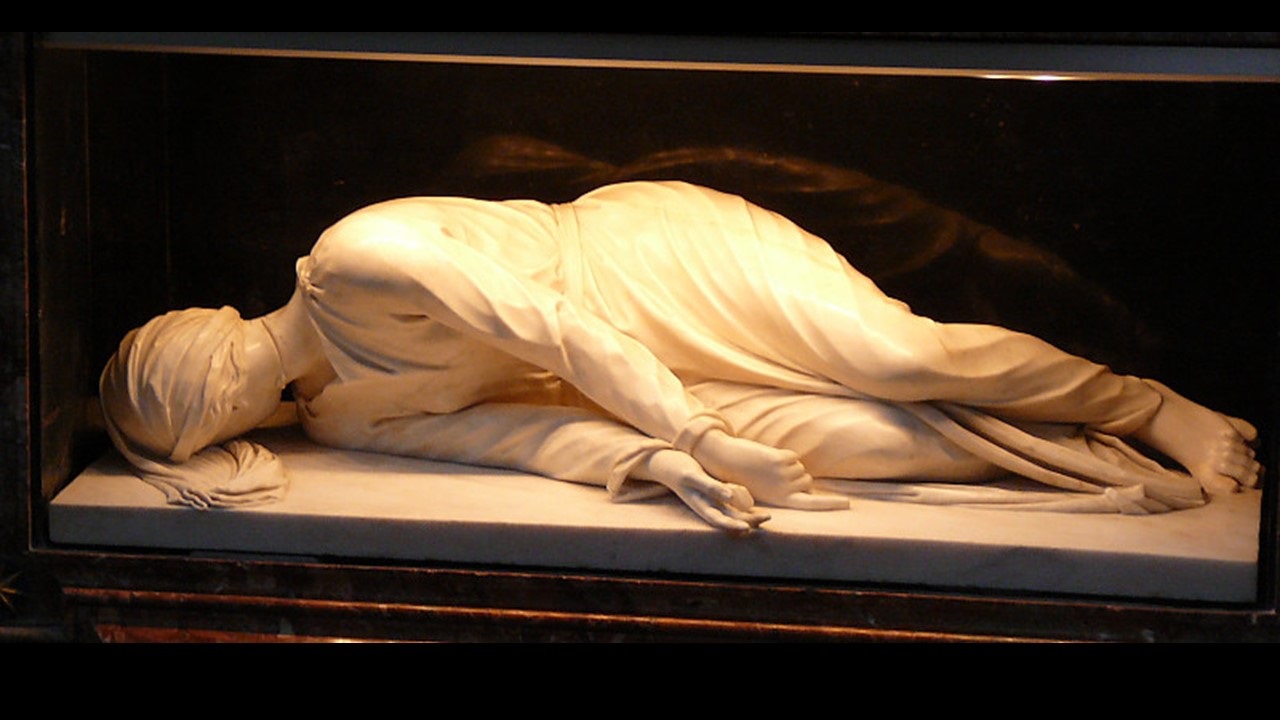.
Via Appia
Beneath the pines of Rome, the wrinkled sibyl
will croak your future for eleven cents,
and with her finger in the dust will scribble
predictions of uncertain consequence.
But go near, fix your eyes on her immense
eyes, clear blue like the Roman sky but colder:
you’ll see yourself reflected, decades older.
.
.
St. Cecilia of Maderno
The music in the marble no one hears,
but crumpled there you catch the minor key
of wedding waltzes, while your neck drips tears
like pearls your eager husband carelessly
unfastened, as you begged him not to be
like other men, but with you fall instead
into the love that made you lose your head.
.
.
Daphne
In order to confess my faithlessness
I grew her back from seed. Her limbs got knotted
into her roots, alas, and then a mess
of flowers filled her ears and mouth, and rotted,
although I drained the soil and repotted.
At last she woke; I said my piece, and she
looked up and shook her leaves, forgiving me.
.
.
Luca D’Anselmi teaches Latin and Greek. He is currently on sabbatical at the Augustinian Patristic Institute.















These are wonderful and their exquisite specifics evoke the whole City around them!
I don’t know if I like Via Appia or St. Cecilia of Maderno better. I managed to avoid the sibyl’s eyes when I was there but Via Appia was an obscure decision point for me. Now I really am decades older. I wonder what is the significance of the “eleven cents.”
The St. Cecilia poem: pearl age! The amazing thing is, her husband listened. He caught the music that moved her, maybe at one remove: like the poet of the Grecian urn saw something better than his experience there, to intuit sweeter melodies unheard.
I’ll have to keep thinking about Daphne.
O Luca, tui poemata quam pulchra sunt. Placet mihi sensum naturalis, tamquam ego ibi essem, peregrinatione Roma inspirata sunt?
These are wonderfully affecting poems. Many thanks for such delicate profundity.
Pagan prophecy, Christian sainthood, and classical myth — three brilliant little pieces that are perfectly faceted and polished, like gemstones.
Moderators — the final “i” of Anselmi’s surname has been left off the large title.
The brief piece on Saint Cecilia is a touching lyric because it manages to express genuine affection between Cecilia and Valerian, as well as her overarching consecration to Christ.
These are both exquisite and moving. Thank you!
These are all little gems that pack an entire story into seven lines of pentameter (semi-sonnets?). They are also finely crafted (rhyming “Sibyl” with “scribble” was particularly clever). They also make a fine use of metaphor to transform the subject into a greater theme. I think “Daphne” does this particularly well, transforming the simple watering of a wilting plant into a statement about love. Fine work!
Just wanted to say that the first poem, in particular, Via Appia, seems just lovely to me; you have managed to have naturalness of expression combined with formal structure in such a poetic way! Well-done! Interesting line-breaks…
All three are exquisitely crafted and preternaturally conceived gems.
Thank you all for your kind and thoughtful comments! They are much appreciated!